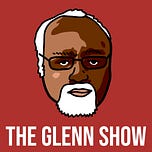As I announced last week, we here at the newsletter and The Glenn Show have a new partner: the Manhattan Institute. I realize some of you may not be familiar with the Institute’s work and point of view, so today I’ve got Manhattan Institute President Reihan Salam on the show to talk about what the Institute does and how some of its scholars and fellows are thinking about the problems facing New York and other American cities today. The Manhattan Institute is often regarded as a conservative place, but as you’ll hear, there’s nothing predictable or partisan about how Reihan understands those problems and their potential solutions.
Reihan begins by talking a bit about how he first became aware of me and my work. He’s a formidable thinker himself, so I have to say I’m pretty flattered! After discussing how he came to take on his current role at the Manhattan Institute, Reihan talks about some of the changes in crime rates in US cities necessitate a renewed focus on public safety. New York City Mayor Eric Adams, a Democrat, has shifted more resources to public safety-oriented initiatives. Reihan talks about what that shift might mean for the city. In many ways, Adams’s approach to governing doesn’t line up with Democratic national policy positions, and Reihan talks about how dissenters within political parties and movements (both left and right) can create needed change. Some of that change, Reihan argues, needs to come from more investment in certain government-run agencies, including those that comprise the criminal justice system. For example, he wants to see safer streets for ordinary citizens but also safer prisons for the incarcerated.
The conversation moves on to education, and Reihan describes what he sees as the positive developments in New York schools under Michael Bloomberg, which languished under Bill de Blasio’s mayorship. And finally, we turn to race matters. Reihan is deeply skeptical that flattening out racial and ethnic identity under the banner of “BIPOC” actually helps ethnic minority communities, and he’s equally skeptical of the ways that racial identity has become central to how so many people think of themselves today. I agree, but I also wouldn’t want to discard the valuable histories and traditions that go along with our conception of race and identity. Maybe I want it both ways, but shouldn’t I be able to have that?
If this conversation is any indication, TGS and MI have got a long, fruitful collaboration ahead of us. I’m looking forward to all the good work to come.
This post is free and available to the public. To receive early access to TGS episodes, an ad-free podcast feed, Q&As, and other exclusive content and benefits, click below.
Featured Content from City Journal
Renu Mukherjee on San Franscisco's misguided effort to do away with standardized testing for its most selective public high school—how it undermined merit and hurt many of the kids it intended to help.
0:00 Glenn’s impact on Reihan
5:38 How Reihan became president of the Manhattan Institute
11:15 What is the Manhattan Institute’s relationship to Eric Adams’s administration?
18:40 The value of dissenters
22:07 Reihan: We’ve underinvested in our criminal justice system
29:31 What constitutes a quality high school education?
36:38 Michael Bloomberg’s education initiatives
41:58 Reihan’s concerns about racial reification
50:08 The uses and abuses of racial identity
Links and Readings
Tariq Modood, Steven Teles, and Glenn’s book, Ethnicity, Social Mobility, and Public Policy: Comparing the US and UK
Rafael Mangual’s book, Criminal (In)Justice: What the Push for Decarceration and Depolicing Gets Wrong and Who It Hurts Most
Ismail K. White and Chryl N. Laird’s book, Steadfast Democrats: How Social Forces Shape Black Political Behavior
Matt Feeney’s book, Little Platoons: A Defense of Family in a Competitive Age














Share this post